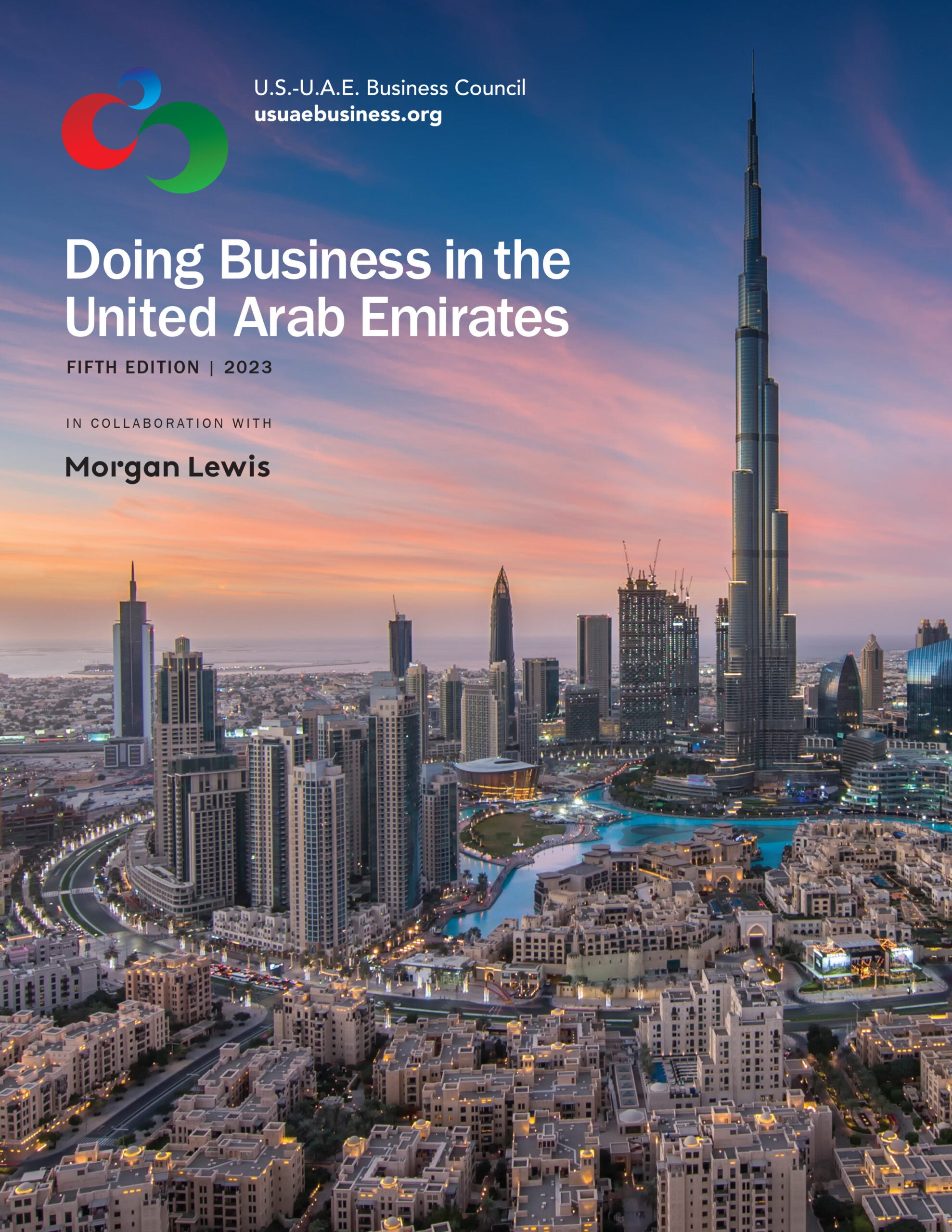The U.S.-U.A.E. Business Council is pleased to release the fifth edition of its report, “Doing Business in the United Arab Emirates,” published in collaboration with Founding Business Council member Morgan, Lewis & Bockius LLP. To read the full U.S.-U.A.E. Business Council report on doing business in the U.A.E., please click here.
This fifth edition of the U.S.-U.A.E. Business Council’s guide to “Doing Business in the U.A.E.” takes stock of significant policy reforms since the last publication of this guide in 2021 and the implications of these reforms for American companies interested in launching or expanding operations in the U.A.E.
The last edition of this guide covered important changes largely associated with the “Projects of the 50,” initiatives aimed to advance the U.A.E.’s economic competitiveness and boost foreign direct investment. The reforms, which coincided with the U.A.E.’s 50th anniversary, included changes to business establishment costs, foreign ownership, boards of directors PJSC, national service agents, public offerings, bounced checks, intellectual property protection, economic substance regulations, ultimate beneficial owners, citizenship, and visas. They were collectively intended to make sure the U.A.E.’s next 50 years are as bright as the last.
This updated guide, coming within a context of increased regional competition, looks at new regulations that will seek to make the U.A.E. a global economic hub. Key recent developments include:
1.Corporate Income Tax: The U.A.E. issued U.A.E. Federal Decree-Law No. 47 of 2022 on the Taxation of Corporations and Businesses on December 9, 2022, which took effect on June 1, 2023. This imposes a 9% business tax on all annual taxable profits above AED 375,000, with exemptions for many of the U.A.E.’s free zones.
2.Comprehensive Economic Partnership Agreements (CEPAs): The U.A.E. has initiated bilateral trade agreements, known as Comprehensive Economic Partnership Agreements (“CEPAs”), with a variety of countries outside of the Gulf Cooperation Council (“GCC”). The U.A.E. signed its first CEPA with India on February 18, 2022, and has since signed agreements with Israel on May 31, 2022, Indonesia on July 1, 2022, Turkey on March 4, 2023, and Cambodia on June 8, 2023. These CEPAs will allow the U.A.E. to grow its trade with key international markets and will create greater economic and trade opportunities, particularly in non-oil sectors.
3.Workweek Changes: The U.A.E. adopted a four-and-a-half-day working week for federal government entities, along with establishing Saturday and Sunday as official weekend days for the government sector, on January 1, 2022. The new working hours will better align the U.A.E. with global markets and enhance business opportunities for U.A.E.-based and multinational companies.
4.Family Businesses: The U.A.E. issued Federal Decree-Law No. 37 of 2022 to help enhance the contribution of family businesses to the economy and improve their role in the private sector. Thabat Venture Builder, a program launched in September 2022, aims to double family-owned businesses’ contribution to the U.A.E.’s GDP to $320 billion (1.175 trillion AED) by 2032.
5.Unemployment Insurance Law: The U.A.E. implemented a mandatory unemployment insurance scheme under Federal Decree-Law No. 13 of 2022 to which Emiratis and residents working in the private and federal government sectors must subscribe. The goal is to retain and attract talent while boosting competitiveness in the labor market and simultaneously providing social protection.
6.Emiratization Resolution: The U.A.E. issued Ministerial Resolution No. 279 of 2022 on June 6, 2022, which came into effect on January 1, 2023. This resolution applies to private sector companies registered with the Ministry of Human Resources and Emiratization (MoHRE). As it states, 2% of the total skilled workforce of registered companies with more than 50 employees must be U.A.E. nationals. This quota will increase by 2% each year until 10% of the company’s total skilled workforce is U.A.E. nationals. On July 11, 2023, it was announced that private companies with 20–49 employees are additionally included in the government’s Emiratization rules.
7.Work Permit Extension: The Federal National Council, the U.A.E.’s parliamentary body, extended the duration of work permits in the U.A.E. from two years to three years in May 2023.
8.Electronic Transactions: The U.A.E. implemented new legislation stating that electronic signatures and documents carry the same weight as their physical counterparts. In addition, transactions can be concluded automatically and may be enforceable and legally binding, even in the absence of direct interaction between physical persons.
9.Personal Status Law: The U.A.E. has now permitted non-Muslims to marry and divorce in non-Sharia civil ceremonies. These laws also cover inheritance and child custody.
In addition to instituting the above economic and social reforms, the U.A.E. has also taken other significant political and strategic measures that will support the country’s business environment, including:
1.Government Appointments: The U.A.E. has made significant changes in government leadership and restructured the Abu Dhabi Executive Council. His Highness Sheikh Mohamed bin Zayed Al Nahyan became President of the U.A.E. in May of 2022, following the death of His Highness Sheikh Khalifa bin Zayed Al Nahyan. This year, H.H. Sheikh Mohamed appointed Sheikh Mansour bin Zayed Al Nahyan as U.A.E. Vice President, Sheikh Khaled bin Mohamed bin Zayed as Crown Prince of Abu Dhabi, and Sheikh Tahnoon bin Zayed and Sheikh Hazza bin Zayed as Deputy Rulers of Abu Dhabi.
2.“We the U.A.E. 2031”: The U.A.E. adopted “We the U.A.E. 2031” to continue its national development plan for the next 10 years, focusing on social, economic, and investment aspects. The plan aims to enhance the U.A.E.’s position as a global partner and successful global economic hub. The plan is based on four pillars: forward society, forward economy, forward diplomacy, and forward ecosystem.
3.COP 28: The U.A.E. will host the Conference of the Parties (COP) 28 at the end of 2023 as part of the United Nations Framework Convention on Climate Change. H.E. Dr. Sultan Al Jaber emphasized that this COP will be a “COP of action, a COP for all.” This conference will bring together governmental organizations and private sector companies to showcase businesses’ sustainability initiatives and commitments, with the goal to reduce carbon emissions.
4.I2U2 Initiative: The U.A.E., together with India, Israel, and the United States, established a collaborative partnership between the four governments on July 14, 2022. This initiative will provide opportunities for economic growth and security and will enhance economic partnerships between private sector companies in each of the member countries.
5.IMEC: In September 2023, the leaders of the United States, India, Saudi Arabia, the United Arab Emirates, France, Germany, Italy, and the European Union announced a Memorandum of Understanding committing to work together to develop a new India-Middle East-Europe Economic Corridor (IMEC). Announced at the G20 Leaders’ event on the Partnership for Global Infrastructure and Investment, this corridor is meant to stimulate economic development through enhanced connectivity and economic integration across two continents, thus unlocking sustainable and inclusive economic growth.
6.Improvement in Ties with Neighbors: The U.A.E. continues to improve relations with its regional neighbors, an outgrowth of the Abraham Accords that normalized relations with Israel. As a result, the U.A.E. continues to diversify its economic investments with its regional neighbors including Iran, Israel, and Turkey. The relations between the U.A.E. and Iran have greatly improved, with both countries reinstating their respective ambassadors and welcoming Iran’s normalization with Saudi Arabia in March 2023. The U.A.E. continues to invest in Israel’s economy, aided by the U.A.E.’s free-trade agreement with Israel established in May 2022, with bilateral non-oil trade between the two countries set to cross $3 billion by the end of the year. H.H. Sheikh Mohamed bin Zayed announced that the U.A.E. intends to invest $10 billion into Turkey’s economy, leading to a free-trade agreement between Turkey and the U.A.E. in March 2023. While there is no certainty in life, we anticipate that further significant developments, both legislative and regulatory, will be forthcoming, including:
- Establishment of the U.A.E. Data Office
- Enactment of the Personal Data Law
- Updates to the U.A.E. Health Data Law (Federal Law No. 2 of 2019)
- Further relaxation of foreign corporate ownership restrictions
- Removal of the U.A.E. from the FATF Grey List
- Continued economic diversification efforts across core non-oil sectors
- Increase in CEPAs
- Significant growth and development in terms of the U.A.E.’s capital market infrastructure
Many of the foregoing are outlined and discussed in more detail in the guide.
While the U.A.E. has accelerated the pace of reforms during and after the pandemic, it is important to note that this spirit of reform is not new. Indeed, the U.A.E. has diligently worked to improve the ease of doing business in the country for decades, and it is set to continue to make bold reforms in the years ahead. This continuing process of reforms is why, in an increasingly competitive regional environment, the U.A.E. will continue to be the regional hub for trade and business for the foreseeable future.
For more information on the Business Guide, please contact Amira Siddiqi at asiddiqi@usuaebusiness.org

